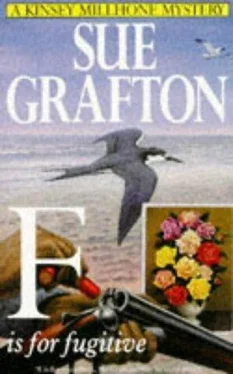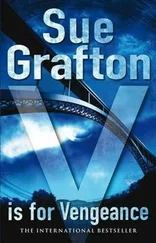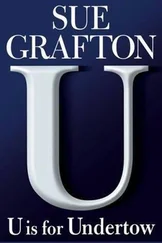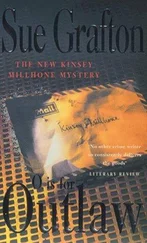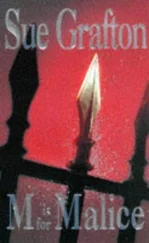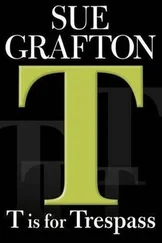Sue Grafton - F is For Fugitive
Здесь есть возможность читать онлайн «Sue Grafton - F is For Fugitive» весь текст электронной книги совершенно бесплатно (целиком полную версию без сокращений). В некоторых случаях можно слушать аудио, скачать через торрент в формате fb2 и присутствует краткое содержание. Жанр: Триллер, на английском языке. Описание произведения, (предисловие) а так же отзывы посетителей доступны на портале библиотеки ЛибКат.
- Название:F is For Fugitive
- Автор:
- Жанр:
- Год:неизвестен
- ISBN:нет данных
- Рейтинг книги:3 / 5. Голосов: 1
-
Избранное:Добавить в избранное
- Отзывы:
-
Ваша оценка:
- 60
- 1
- 2
- 3
- 4
- 5
F is For Fugitive: краткое содержание, описание и аннотация
Предлагаем к чтению аннотацию, описание, краткое содержание или предисловие (зависит от того, что написал сам автор книги «F is For Fugitive»). Если вы не нашли необходимую информацию о книге — напишите в комментариях, мы постараемся отыскать её.
F is For Fugitive — читать онлайн бесплатно полную книгу (весь текст) целиком
Ниже представлен текст книги, разбитый по страницам. Система сохранения места последней прочитанной страницы, позволяет с удобством читать онлайн бесплатно книгу «F is For Fugitive», без необходимости каждый раз заново искать на чём Вы остановились. Поставьте закладку, и сможете в любой момент перейти на страницу, на которой закончили чтение.
Интервал:
Закладка:
"But what are his chances, realistically?"
"Hey, I'm doing what I can. Bail's been set at half a million bucks, which is ridiculous. We're not talkin' Jack the Ripper here. I'll enter a motion to reduce. And maybe I can talk the prosecuting attorney into letting him plead to escape for the minimum. The time'll be added on, of course, but there's no way around that."
"And if I come up with some convincing evidence that someone else killed Jean Timberlake?"
"Then I'd move to set aside the original plea, or maybe file a coram nobis. Either way, we'd be set."
"Don't count on it, but I'll do what I can."
He flashed a smile at me, holding up crossed fingers.
When we got to the courthouse, he left me in the lobby while he went down to meet with the prosecuting attorney and the judge in chambers. The coffee shop was really no more than a wide expanse of central lobby, jammed with people now, the press in evidence. Royce was seated at a small table near the stairs, his hands folded across the top of his cane. He seemed tired. His hair had that matted, slightly sweaty cast of someone in ill health. He had ordered coffee, but it sat in the cup looking cold and untouched. I took a seat. The waitress swung by with a fresh pot of coffee, but I shook my head. Royce's anxiety enveloped the table like a sour, hopeless scent. He was clearly a proud man, accustomed to bending the world to his will. Bailey's arraignment already bore all the trappings of a public spectacle. The local paper had been running the story of his capture on the front page for days, and the local radio stations made mention of it at the top of each hour and again in the quick news summaries on the half hour.
A crew with a minicam passed just to the right of us, heading down the stairs without realizing Bailey Fowler's father was sitting within camera range. He turned a baleful eye on them and the ensuing smile was bitter and brief.
"Maybe we better go on down," I said.
We descended the stairs, walking slowly. I controlled an urge to give him physical support, sensing that he might take offense. His stoicism had a hint of self-mockery to it. He was grimly amused to have prevailed thus far, forcing his body to do his bidding regardless of the cost.
The corridor below was lined on one side with big plate-glass windows, with two exits into a sunken courtyard. Both the interior passageway and the exterior stairways were filling with spectators, some of whom seemed to recognize Royce as we passed. There was a silent parting in the crowd; gazes averted as we made our way into the courtroom. In the third row, people squeezed together to make room for us. There was the same hushed murmuring as in a church before services start. Most had dressed in their Sunday best, and the air seemed to stir with conflicting perfumes. No one spoke to Royce, but I could sense the rustling and nudging going on all around us. If he was humbled by the reaction, he gave no sign. He had been a respected member of the community, but Bailey's notoriety had tainted him. To have a son accused of murder is the same as being accused of a crime oneself-parental failure of the direst sort. Unfair though it may be, there is always that unspoken question: What did these people do to turn this once-innocent child into a cold-blooded killer of another human being?
I had checked the docket posted in the upstairs corridor. There were ten other arraignments scheduled that morning in addition to Bailey's. The door to the judge's chambers was closed. The court clerk, a slim, handsome woman in a navy blue suit, was seated at a table below and to the right of the judge's bench. The court reporter, also female, sat at a matching table to the left. There were a dozen attorneys present, most in dark, conservatively cut suits, all with white shirts, muted ties, black shoes. Only one was female.
While we waited for the proceedings to begin, I scanned the crowd. Shana Timberlake was seated across the aisle from us, one row back.
Under the flat fluorescent lights, the illusion of youth vanished and I could see the dark streaks at the corners of her eyes, suggesting age, weariness, too many nights in bad company. She was wide-shouldered, heavy-breasted, slender through the waist and hips, wearing jeans and a flannel shirt. As mother of the victim, she was free to dress any way she liked. Her hair was nearly black, with a few strands of silver here and there, combed straight back from her face and held with a clip on top. She turned her hot, dark eyes on me and I looked away. She knew I was with Royce. When I glanced back, I could see her gaze lingering on him with a blunt appraisal of his physical condition.
One other woman caught my attention as she came down the aisle. She was in her early thirties, sallow, thin, wearing an apricot knit dress with a big stain across the hem. She had on a white sweater and white heels with short white cotton socks. Her hair was a dishwater blond, held back with a wide, tatty-looking headband. She was accompanied by a man I assumed was her husband. He appeared to be in his mid-thirties, with curly blond hair and the sort of pouty good looks I've never liked. Pearl was with them, and I wondered if this was the son he'd referred to who had seen Bailey with Jean Timberlake the night she was killed.
There was a faint escalation of murmurs at the rear of the courtroom and I turned my head. The crowd's attention focused in the way it does at a wedding when the bride appears, ready to begin her walk down the aisle. The prisoners were being brought in and the sight was oddly disturbing: nine men, handcuffed, shackled together, shuffling forward with their leg chains. They wore jail garb: unconstructed cotton shirts in orange, light gray, or charcoal, and gray or pale blue cotton pants with JAIL stenciled across the butt, white cotton socks, the type of plastic sandals known as "jellies." Most of them were young: five Latinos and three black guys. Bailey was the only white. He seemed acutely self-conscious, high color in his cheeks, his eyes downcast, the modest star of this chorus line of thugs. His fellow prisoners seemed to take the proceedings for granted, nodding to the scattering of friends and relatives. Most of the spectators had come to see Bailey Fowler, but nobody seemed to begrudge him his status. A uniformed deputy escorted the men into the jury box up front, where their leg chains were removed in case one of them had to approach the bench. The prisoners settled in, like the rest of us, to enjoy the show.
The bailiff went through his "all rise" recital, and we dutifully rose as the judge appeared and took his seat. Judge McMahon was in his forties and bristled with efficiency. Trim and fair-haired, he looked like the kind of man who played handball and squash, and risked dropping dead of a heart attack despite his prior history of perfect health. Bailey's case was being called next to last, so we were treated to a number of minor procedural dramas. A translator had to be summoned from somewhere in the building to aid in the arraignments of two of the accused who spoke no English. Papers had been misfiled. Two cases were kicked over to another date. Another set of papers had been sent but never received, and the judge was irked about that because the attorney had no proof of service and the other side wasn't ready. Two additional defendants, out on OR, were seated in the audience and each stepped forward in turn as his case was called.
At one point, one of the deputies pulled out a set of keys and unlocked an accused's handcuffs so that he could talk to his attorney at the back of the room. While that conference was going on, another prisoner engaged the judge in a lengthy discussion, insistent on representing himself. Judge McMahon was very opposed to the idea and spent ten minutes warning and admonishing, advising and scolding. The defendant refused to budge. The judge was finally forced to concede to the fellow's wishes since it was his right, but he was clearly cross about the matter. Through all of this, an undercurrent of restlessness was agitating the spectators into side-conversations and titters of laughter. They were primed for the lead act, and here they were, having to suffer through this second-rate series of burglaries and sexual assault cases. I half expected them to start clapping in unison, like a movie audience when the film is delayed.
Читать дальшеИнтервал:
Закладка:
Похожие книги на «F is For Fugitive»
Представляем Вашему вниманию похожие книги на «F is For Fugitive» списком для выбора. Мы отобрали схожую по названию и смыслу литературу в надежде предоставить читателям больше вариантов отыскать новые, интересные, ещё непрочитанные произведения.
Обсуждение, отзывы о книге «F is For Fugitive» и просто собственные мнения читателей. Оставьте ваши комментарии, напишите, что Вы думаете о произведении, его смысле или главных героях. Укажите что конкретно понравилось, а что нет, и почему Вы так считаете.
